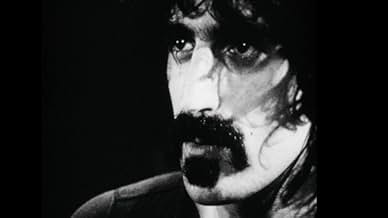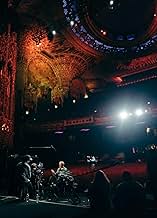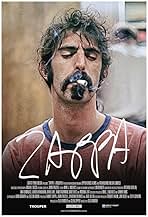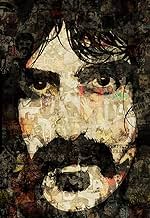CALIFICACIÓN DE IMDb
7.5/10
3.9 k
TU CALIFICACIÓN
Una mirada en profundidad a la vida y obra del músico Frank Zappa.Una mirada en profundidad a la vida y obra del músico Frank Zappa.Una mirada en profundidad a la vida y obra del músico Frank Zappa.
- Premios
- 5 nominaciones en total
Frank Zappa
- Self
- (material de archivo)
Lonnie Lardner
- Self - Newscaster for Action News
- (material de archivo)
Patrice Zappa
- Self - Frank Zappa's Sister
- (material de archivo)
Carl Zappa
- Self - Frank Zappa's Brother
- (material de archivo)
Rose Zappa
- Self - Frank Zappa's Mother
- (material de archivo)
Francis Zappa
- Self - Frank Zappa's Father
- (material de archivo)
Edgard Varèse
- Self
- (material de archivo)
Don Van Vliet
- Self
- (material de archivo)
- (as Captain Beefheart)
Frank Zappa and the Mothers of Invention
- Themselves
- (material de archivo)
Johnny 'Guitar' Watson
- Self
- (material de archivo)
The Beatles
- Themselves
- (material de archivo)
Tom Wilson
- Self - Music Producer
- (material de archivo)
Euclid James 'Motorhead' Sherwood
- Self - Baritone Saxophone
- (material de archivo)
- (as Motorhead Sherwood)
- …
Opiniones destacadas
Very personal look at a crazy, brilliant, brave, unique, individual.
While I have never been a fan of his music, I've always been a huge fan of his originality and passion for freedom.
Though the producers and directors of this movie paint conservative politicians as the oppressors, I believe that Frank knew it was all politicians. I wonder what he would say about the country we are living in today.
While I have never been a fan of his music, I've always been a huge fan of his originality and passion for freedom.
Though the producers and directors of this movie paint conservative politicians as the oppressors, I believe that Frank knew it was all politicians. I wonder what he would say about the country we are living in today.
As a backer of the vault saving project which lead to this movie, and a long time Zappa fan I have read 'The Real Frank Zappa' book and many other articles, clips, etc. throughout his life so maybe I'm coming from a different viewpoint than the average viewer.
There is a lot of new footage and a few new things to be learnt about his life but there are many moments in the movie where I feel that the details are left out just a little too much - for example Frank worked for Studio Z before he bought it - he also bought up film sets with expectation of making movies.
I would have loved to have seen/heard more about his younger life, and the Garrick theater shenanigans, etc.
Otherwise the movie is beautifully made..
There is a lot of new footage and a few new things to be learnt about his life but there are many moments in the movie where I feel that the details are left out just a little too much - for example Frank worked for Studio Z before he bought it - he also bought up film sets with expectation of making movies.
I would have loved to have seen/heard more about his younger life, and the Garrick theater shenanigans, etc.
Otherwise the movie is beautifully made..
I have been a lover of Frank Zappa's music since the late 70's. In the Fall of 1977, a friend asked me if I had ever listened to Frank Zappa, and I responded with disgust, relating to him the (false) urban legend of Zappa winning a "gross-out" contest with Alice Cooper by eating one of Cooper's own fresh turds on-stage. Without another word, my friend jumped up and put an album on - I didn't see (or ask) what album it was. After the first minute or so of music, I was really digging it, so I asked my friend who the artist was. "Frank Zappa," he replied (the album was "Roxy and Elsewhere," the side with "Village of the Sun" on it).
I was transfixed - I spent the rest of the afternoon in my friend's dorm room, cutting classes and going through my friend's Zappa albums. I have been a "Zappacolyte" ever since.
Winter's documentary offers a view of Frank Zappa as seen "from behind the curtain." There are loads of interviews with Frank, but also with Gail Zappa and with many members of Frank's bands over the years, as well as with friends and associates (for example, Alice Cooper appears in the movie). I found the interviews of Ruth Underwood and Steve Vai particularly insightful and touching. Along with the interviews, a huge treasure trove of footage is presented which is edited and spliced perfectly with the voice-overs.
Thankfully, Winter worked extra-hard to show us the "real" Frank Zappa. To do anything less would've allowed the movie to descend into a hagiography that would've been the ultimate insult to the memory of a unique genius like Frank.
"Zappa" starts somewhat slowly and perhaps a little pedantically, but this helps to lay the foundation for the presentation of Frank's later years. By the end, I had tears in my eyes as Winter's biography culminated in a heartfelt yet "open-eyed" tribute to one of the greatest musicians, composers, and spokesmen of our time.
I was transfixed - I spent the rest of the afternoon in my friend's dorm room, cutting classes and going through my friend's Zappa albums. I have been a "Zappacolyte" ever since.
Winter's documentary offers a view of Frank Zappa as seen "from behind the curtain." There are loads of interviews with Frank, but also with Gail Zappa and with many members of Frank's bands over the years, as well as with friends and associates (for example, Alice Cooper appears in the movie). I found the interviews of Ruth Underwood and Steve Vai particularly insightful and touching. Along with the interviews, a huge treasure trove of footage is presented which is edited and spliced perfectly with the voice-overs.
Thankfully, Winter worked extra-hard to show us the "real" Frank Zappa. To do anything less would've allowed the movie to descend into a hagiography that would've been the ultimate insult to the memory of a unique genius like Frank.
"Zappa" starts somewhat slowly and perhaps a little pedantically, but this helps to lay the foundation for the presentation of Frank's later years. By the end, I had tears in my eyes as Winter's biography culminated in a heartfelt yet "open-eyed" tribute to one of the greatest musicians, composers, and spokesmen of our time.
A decent documentary, but certainly not "definitive". Given the fact the Alex Winter had unlimited access to the Zappa vault I had expected more rare footage. Still, as a general introduction to the person Frank Zappa it's not a bad starting point.
Greetings again from the darkness. Frank Zappa's music was never considered mainstream. His songs were rarely played on the radio. In his entire career, he charted one Top 40 song, and that was driven by his daughter. To some, he was known as a political activist and a spokesperson first, and a musician second. At times he was an enigma and a rebel or maverick, and he's even described as trying not to write a hit song. Alex Winter may be best known as Bill in the "Bill and Ted" movies, and he's also a successful documentary filmmaker (DEEP WEB, 2015). This time out he turns his focus on the career and life of Frank Zappa.
One of the first things we see is Frank Zappa taking us on a tour of his personal vault located at his Laurel Canyon home. It's an enormous private collection that captures quite a bit of history from the 1960's forward. Zappa points out some of his favorites including his jams with Eric Clapton in the basement and music with his friend Captain Beefheart (Don Van Vliet). These are original masters of Zappa's work over the decades, and he was nothing if not prolific, releasing 62 albums during his career, and another 53 following his death in 1993.
Acting as bookends for the film are clips of Zappa's 1991 live show in Prague, where he is helping celebrate the withdrawal of Russian troops. It's also his last guitar performance on stage. An incredible amount of footage exists of Zappa pontificating on one subject or another, sometimes on television, sometimes in front of news cameras, and even in front of a Senate committee. His music and his life was usually focused on social commentary, opinions not always popular with the establishment.
It's very interesting to hear Zappa talk about his early influences, particularly how he never outgrew his love for editing - something that began with the 8mm films at his childhood homes. He didn't begin playing music until his early teenage years, and it was orchestral before rock. He always considered himself a composer, and what a prolific writer he was. It's an unusual film in that it not only tracks the timeline of his career, but we are privileged to hear Zappa's opinions directly from him thanks to the unending recordings and archival footage available.
Mr. Winter includes much more than Zappa. We hear from musicians that made up the Mothers of Invention, including Steve Vai, Bunk Gardner, Ian Underwood, and an emotional Ruth Underwood. We also hear from renowned Rock n Roll groupie Pamela Des Barres, and Frank's wife Gail. It's noted that Zappa disbanded the Mothers of Invention in 1969, and there were many iterations that played afterwards. Some of the prominent names included violinist Jean Luc Ponty, and Howard Kaylan and Marc Volman of The Turtles fame. There is even a terrific clip of John Lennon and Yoko Ono performing on stage with Zappa and his band ... shocking for anyone not familiar with Yoko's infamous primal screams.
One of the best stories included is how Zappa's biggest hit came to be. A note from his young daughter, Moon Unit, introducing herself to her frequently absent father led to a collaboration on the single "Valley Girl", which cracked the Top 40. There are also stories on his dreaded hosting of "Saturday Night Live", as well as pieces on the Kronos Quartet, London Symphony Orchestra, and Ensemble Modern performing his music. In 1979, Zappa became the first musician to go completely independent with his own label, and this is only a few years after he was seriously injured by being attacked on stage.
Some may recall Zappa's appearance in front of the Senate committee in regards to the drive to include Parental warning labels on published music. Zappa viewed this as nothing more than censorship, and he was one of the few musicians to fight the battle against the opponents led by the wife of White House Chief of Staff James Baker. Zappa was certainly a man of principles, and had no time for those who weren't. It was pancreatic cancer that took his life, but a life well lived it was. His time as a symbol of freedom in Czechoslovakia is proof that he never shied away from standing up for what he believed in. So like his music or not - he surely didn't care. But he respected those who cared for society and freedom. Filmmaker Winter does a nice job with a two hour run time, when the material exists for a 4 part series.
One of the first things we see is Frank Zappa taking us on a tour of his personal vault located at his Laurel Canyon home. It's an enormous private collection that captures quite a bit of history from the 1960's forward. Zappa points out some of his favorites including his jams with Eric Clapton in the basement and music with his friend Captain Beefheart (Don Van Vliet). These are original masters of Zappa's work over the decades, and he was nothing if not prolific, releasing 62 albums during his career, and another 53 following his death in 1993.
Acting as bookends for the film are clips of Zappa's 1991 live show in Prague, where he is helping celebrate the withdrawal of Russian troops. It's also his last guitar performance on stage. An incredible amount of footage exists of Zappa pontificating on one subject or another, sometimes on television, sometimes in front of news cameras, and even in front of a Senate committee. His music and his life was usually focused on social commentary, opinions not always popular with the establishment.
It's very interesting to hear Zappa talk about his early influences, particularly how he never outgrew his love for editing - something that began with the 8mm films at his childhood homes. He didn't begin playing music until his early teenage years, and it was orchestral before rock. He always considered himself a composer, and what a prolific writer he was. It's an unusual film in that it not only tracks the timeline of his career, but we are privileged to hear Zappa's opinions directly from him thanks to the unending recordings and archival footage available.
Mr. Winter includes much more than Zappa. We hear from musicians that made up the Mothers of Invention, including Steve Vai, Bunk Gardner, Ian Underwood, and an emotional Ruth Underwood. We also hear from renowned Rock n Roll groupie Pamela Des Barres, and Frank's wife Gail. It's noted that Zappa disbanded the Mothers of Invention in 1969, and there were many iterations that played afterwards. Some of the prominent names included violinist Jean Luc Ponty, and Howard Kaylan and Marc Volman of The Turtles fame. There is even a terrific clip of John Lennon and Yoko Ono performing on stage with Zappa and his band ... shocking for anyone not familiar with Yoko's infamous primal screams.
One of the best stories included is how Zappa's biggest hit came to be. A note from his young daughter, Moon Unit, introducing herself to her frequently absent father led to a collaboration on the single "Valley Girl", which cracked the Top 40. There are also stories on his dreaded hosting of "Saturday Night Live", as well as pieces on the Kronos Quartet, London Symphony Orchestra, and Ensemble Modern performing his music. In 1979, Zappa became the first musician to go completely independent with his own label, and this is only a few years after he was seriously injured by being attacked on stage.
Some may recall Zappa's appearance in front of the Senate committee in regards to the drive to include Parental warning labels on published music. Zappa viewed this as nothing more than censorship, and he was one of the few musicians to fight the battle against the opponents led by the wife of White House Chief of Staff James Baker. Zappa was certainly a man of principles, and had no time for those who weren't. It was pancreatic cancer that took his life, but a life well lived it was. His time as a symbol of freedom in Czechoslovakia is proof that he never shied away from standing up for what he believed in. So like his music or not - he surely didn't care. But he respected those who cared for society and freedom. Filmmaker Winter does a nice job with a two hour run time, when the material exists for a 4 part series.
¿Sabías que…?
- TriviaThe film was not financed by crowdfunding, contrary to popular belief. The Kickstarter campaign was aimed solely at preserving and restoring the contents of the Zappa vault. The film that resulted from that preservation was itself financed by conventional backers.
- ErroresIn the opening titles, it says, Zappa played a concert in the Czech Republic on 24 June 1991, to celebrate the fairly recent departure of Russian troops. It was in fact still Czechoslovakia then.
It then incorrectly states that this was his last recorded guitar performance, but that was in fact one week later at a smaller concert in Budapest.
- Citas
Ruth Underwood: It was that type of music that he could produce that was a product of everything that was in him. But you couldn't really categorize it. You couldn't say, Oh yeah, that's rock and roll, 'cause it wasn't.
Ruth Underwood: It's jazz. No. It really wasn't. It's pop music. No. Not at all. Well, what the hell is it?
Ruth Underwood: It's Zappa.
- ConexionesFeatures The Ernie Kovacs Show (1952)
- Bandas sonorasBolero
Written by Maurice Ravel
Selecciones populares
Inicia sesión para calificar y agrega a la lista de videos para obtener recomendaciones personalizadas
- How long is Zappa?Con tecnología de Alexa
Detalles
Taquilla
- Total en EE. UU. y Canadá
- USD 15,502
- Fin de semana de estreno en EE. UU. y Canadá
- USD 2,019
- 29 nov 2020
- Total a nivel mundial
- USD 220,031
- Tiempo de ejecución2 horas 9 minutos
- Color
- Mezcla de sonido
- Relación de aspecto
- 1.33 : 1
- 1.78 : 1
Contribuir a esta página
Sugiere una edición o agrega el contenido que falta




























